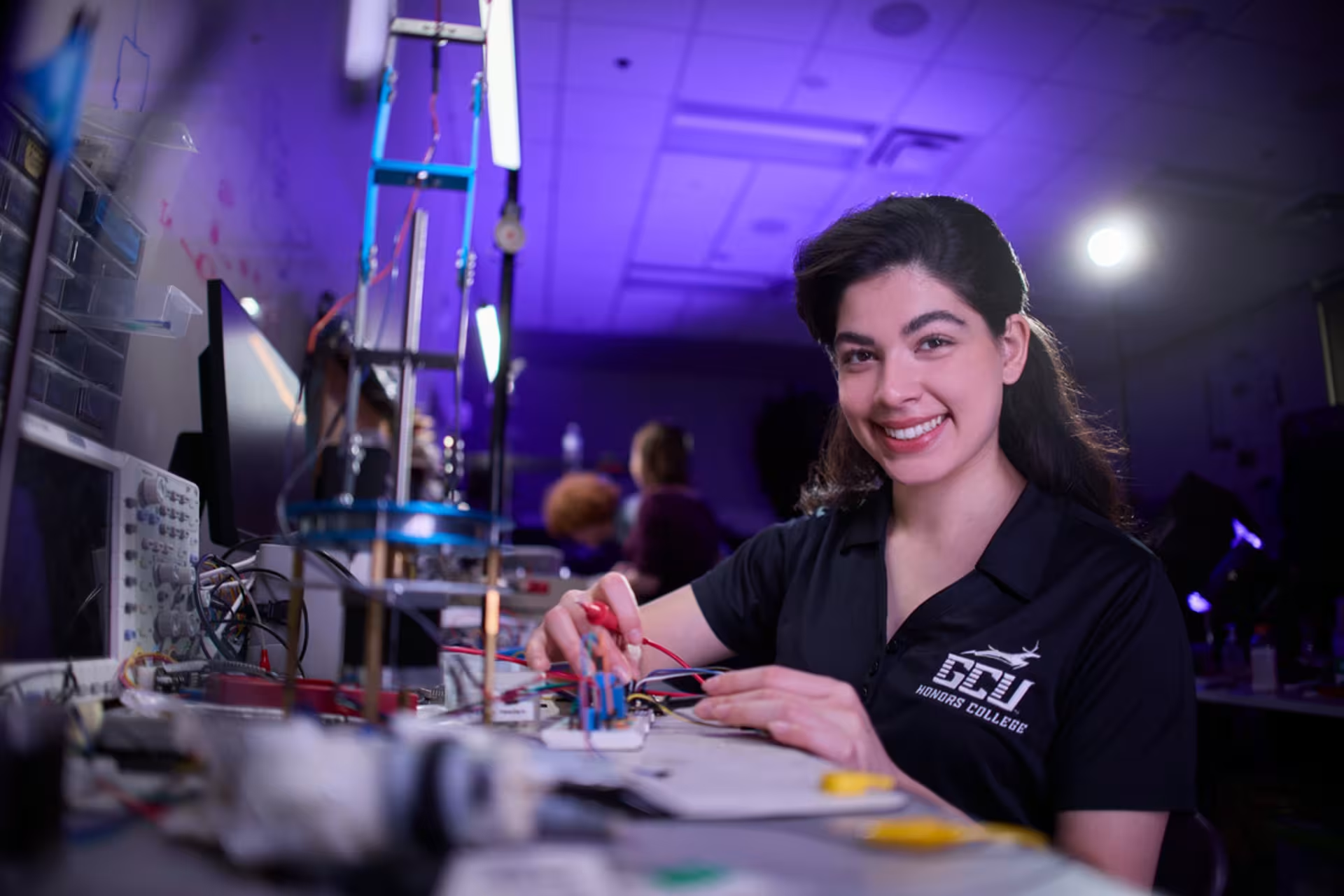
BS in Mechanical Engineering Technology: Mechatronics Emphasis
Integrate Mechanical, Electrical and Computer Systems for Intelligent Machine Design
In mechanical engineering, mechatronics is a multidisciplinary subfield that integrates the principles and applications of mechanical engineering, electrical engineering, control systems and robotics. The Bachelor of Science in Mechanical Engineering Technology with an Emphasis in Mechatronics program at Grand Canyon University teaches the practical applications of mechanical engineering principles along with mechatronics techniques.
This subfield may be an ideal career choice for individuals with a passion for problem-solving and creative innovation. Throughout the program, students will have the opportunity to apply engineering principles to hands-on projects.

Campus: $8,250 per semester [More Info]
Up to 90 credits, only 84 can be lower division
Credits: Fill out the Lopes Eval to find out what will transfer
Admission Requirements (Bachelor's)
- 16+ years old
- High School Graduate
- 3.0+ Unweighted GPA
OR 2.5+ Unweighted GPA and
- ACT: 19
- SAT: 1000*
Admission requirements may differ based on degree level, program and modality, or transfer status. Some programs of study may require a higher GPA and/or other qualifying criteria for admission. Please review full admission and program requirements in the University Policy Handbook.
*Math and reading only on a 1600 point scale (test date after 3/1/2016). SAT score of 1380 required for 2400 point scale (test date before 3/1/2016).
Where Education Meets Innovation in Automation

At GCU, earning a degree involves personal, professional and spiritual growth. As a Christian university, we emphasize the integration of faith with professional ethics, stewardship and discipline. As a mechanical engineering student, you can develop technical expertise while refining your communication and collaboration skills. Campus life encourages connection through faith-based activities, clubs and community service opportunities. Here, engineers can grow both academically and personally.
Mechatronics Courses Taught in This Engineering Degree
The BS in Mechanical Engineering Technology: Mechatronics begins with foundational coursework in physics and computer science, progressing to advanced topics like static and dynamic loading in mechanical systems, CAD design modeling, control systems and heat transfer analysis.
The curriculum combines mathematics, natural sciences and computer programming, focusing on critical thinking, problem-solving and project management. Students complete a two semester capstone project that provides hands-on experience in research and design. You may also have opportunities for internships and assigned projects with engineering professionals. GCU offers extensive STEM resources to support students throughout the program.
Key topics include the following:
From Circuits to Systems: Building Applied Mechatronics Skills

The mechatronics curriculum teaches the skills necessary to design, build and maintain intelligent systems, from autonomous robots and smart devices to advanced industrial automation. This hands-on program combines theory and application, preparing graduates for high-tech environments where mechanical, electrical and software systems intersect.
This program integrates computer programming and electrical and mechanical engineering principles in the following areas:
Embedded systems and microcontrollers
Fluid and thermal transport
Controls and instrumentation
Industrial automation
Electrical troubleshooting
Electromechanical systems principles
Career Possibilities for Graduates
Mechatronics blends mechanical, electrical and software engineering to create intelligent systems and automated technologies. Mechanical engineering: mechatronics graduates may be well-equipped for roles in product design, development, manufacturing and quality assurance.
Graduates may pursue careers in industries such as:(See disclaimer 1)
Machinery manufacturing
Engineering services
Transportation equipment manufacturing
Semiconductor manufacturing
Navigational and control systems manufacturing
Other electronic component manufacturing
Estimated new jobs expected to open for mechanical engineers from 2024 to 2034(See disclaimer 2)
Estimated job growth for mechanical engineers from 2024 to 2034(See disclaimer 2)
ABET-Accredited Engineering Programs
This BS in mechanical engineering technology: mechatronics program is accredited by the Engineering Technology Accreditation Commission of ABET, under the General Criteria and the Mechanical Engineering Technology Program Criteria. When considering your choice of degree programs and your intended career, it’s important to verify that the school you choose is accredited. Accreditation serves as a benchmark for education quality. GCU takes pride in its institutional accreditation, endorsed by the Higher Learning Commission.

Frequently Asked Questions
To learn more about the mechatronics field and the career opportunities within this engineering profession, review these frequently asked questions and their answers.
What is mechatronics?
What kind of jobs can you get with a mechanical engineering technology: mechatronics degree?
What is the difference between robotics and mechatronics engineers?
What do mechatronics engineers do?
Program Curriculum
General Education Requirements
Required General Education Courses
Core Courses

Explore the synergy of mechanical engineering and electronics with mechatronics courses at GCU. Apply now to our bachelor’s in mechanical engineering technology: mechatronics program and step into the future of innovation.
- U.S. Bureau of Labor Statistics. (2025, Sept. 24). Electro-mechanical and Mechatronics Technologists and Technicians. Occupational Outlook Handbook. Retrieved October 2025.
- COVID-19 has adversely affected the global economy and data from 2020 to 2023 may be atypical compared to prior years. Accordingly, data shown is effective August 2025, which can be found here: U.S. Bureau of Labor Statistics, Occupational Outlook Handbook, Mechanical Engineers, retrieved October 2025.
- National Instruments. (n.d.). What is Mechatronics? NI. Retrieved October 2025.
- Martin, S. (2018, Oct. 18). Robotics vs. Mechatronics: Knowing the Difference. Electronics 360. Retrieved September 2023.


